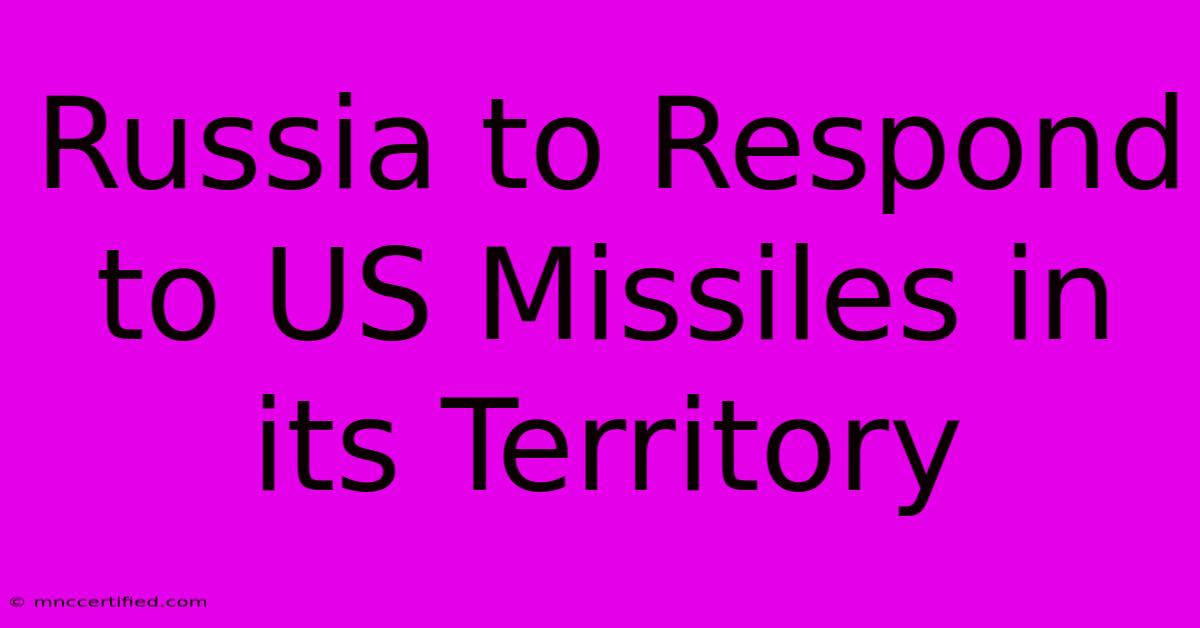Russia To Respond To US Missiles In Its Territory

Table of Contents
Russia to Respond to US Missiles in its Territory: A Complex Geopolitical Situation
The potential deployment of US missiles in territories bordering Russia is a highly sensitive issue, fraught with geopolitical implications and the risk of escalating tensions. This article will examine the potential responses from Russia, the underlying causes of the conflict, and the broader international implications.
Understanding the Context: Why the Deployment Matters
The perceived threat of US missile deployments near Russian borders is a key driver of Moscow's concerns. Russia views such deployments as a direct threat to its national security, potentially undermining its strategic deterrence capabilities. This anxiety stems from historical experiences and a deeply ingrained sense of vulnerability, particularly given past military interventions and perceived encirclement by NATO. The proximity of these missiles is the critical factor, raising concerns about reaction time and the potential for a preemptive strike.
Historical Precedents and Perceived Threats
Russia's anxieties are rooted in historical events, including past conflicts and the expansion of NATO eastward. The fear of a repeat of past experiences fuels Russia's sensitivity to perceived threats, even if the intentions behind the missile deployment are defensive in nature. This historical context shapes Russia’s perception of the situation and its likely response.
Russia's Potential Responses: A Spectrum of Options
Russia's response to US missile deployments will likely depend on several factors, including the scale and nature of the deployment, the level of international condemnation, and Russia's domestic political climate. However, a range of responses is plausible:
1. Diplomatic and Political Pressure:
- Negotiations and dialogue: Russia may attempt to engage in diplomatic negotiations with the US and its allies to de-escalate the situation. This could involve offering concessions or demanding assurances regarding the intended use of the missiles.
- International condemnation: Russia could leverage international forums to condemn the deployment, seeking support from countries sharing similar concerns about US military presence. Public diplomacy and targeted messaging would be key components of this strategy.
2. Military and Strategic Responses:
- Military buildup: Russia might increase its military presence in the affected regions, deploying additional troops, weaponry, and air defense systems. This would serve as a deterrent and a demonstration of Russia's readiness to defend its territory.
- Cyber warfare: Russia could resort to cyberattacks targeting US military infrastructure or communications networks. This option offers a degree of deniability and could disrupt military operations.
- Targeted strikes: In a more aggressive scenario, Russia might consider preemptive strikes against the missile installations, though this carries a significant risk of escalating the conflict. This option, however, is considered highly unlikely without substantial provocation.
3. Economic and Trade Measures:
- Sanctions and counter-sanctions: Economic measures such as sanctions or restrictions on trade could be implemented against countries supporting the missile deployments. This is a less direct but potentially significant response.
The International Implications: A Globalized Crisis
The potential for escalation is a significant concern. A military response from Russia could trigger a wider conflict, drawing in other countries and potentially leading to a large-scale war. This highlights the crucial need for de-escalation through diplomatic channels and open communication.
The Role of International Organizations:
The UN Security Council and other international organizations play a vital role in managing the situation. Their ability to mediate and prevent escalation will be crucial in mitigating the risk of a broader conflict. Effective diplomacy by international players is paramount in defusing this volatile situation.
Conclusion: The Need for Dialogue and De-escalation
The potential deployment of US missiles near Russian borders presents a serious security challenge with the potential for significant escalation. While Russia's responses could range from diplomatic pressure to military actions, the priority for all parties involved should be de-escalation through dialogue and a commitment to diplomacy. A focus on building trust and transparency is essential to prevent a potentially catastrophic conflict. The international community must actively work towards finding a peaceful resolution that respects the security concerns of all parties involved.

Thank you for visiting our website wich cover about Russia To Respond To US Missiles In Its Territory. We hope the information provided has been useful to you. Feel free to contact us if you have any questions or need further assistance. See you next time and dont miss to bookmark.
Featured Posts
-
Nigeria Vs Rwanda Match Highlights
Nov 19, 2024
-
Fcc Chairman Trump Chooses Carr
Nov 19, 2024
-
Mountain One Insurance Pittsfield
Nov 19, 2024
-
Poland 1 2 Scotland Nations League Recap
Nov 19, 2024
-
Best Kc Chiefs Gifts This Holiday
Nov 19, 2024